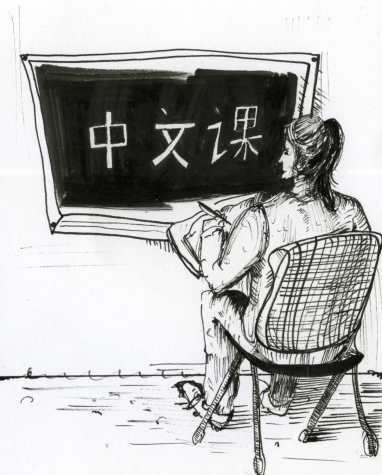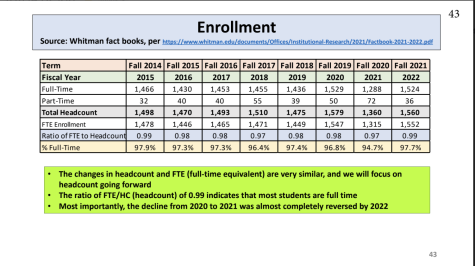Students criticize national college rankings in light of the new U.S. News and World Report rating
September 30, 2021
Whitman jumped nine spots to #38 on the U.S. News and World Report’s annual ranking of National Liberal Arts colleges, up from last year’s position at #47. Every year, U.S. News and World Report ranks 1,466 higher education institutions based on 17 measures of academic quality.
Interim Vice President of Admissions and Financial Aid Adam Miller said the College does not take active measures to receive better rankings from organizations like U.S. News and World Report and that annual fluctuations in rankings are expected.
“While we are always happy to be recognized as one of the top liberal arts schools in the country, rankings do not tell the whole story,” Miller said. “Rankings can also fluctuate significantly from year to year, so we tend not to put too much stock in these numbers when we communicate with prospective students about Whitman.”
Miller wrote that one of the areas that Whitman improved most was faculty resources.
“We went up the most on faculty resources, which includes things like faculty salary and class size—likely influenced by low enrollment last year due to COVID-19,” Miller said in an email to the Wire. “Our alumni giving and graduation rates are also strong.”
On Sept. 13, the Whitman College Instagram page posted a photo of Memorial Hall with a caption announcing the U.S. News and World Report ranking. Class of 2020 alumni Fisher Munro commented on the post, questioning the importance that rankings are given by the College.
“Nice! Some meaningless and profiteering magazine reduced Whitman to a number. And it was a high number! (celebration, ecstasy from the administration)! That’s why I went to a liberal arts college to be honest. So I could be enumerated!” Munro wrote in his comment. “So I could get boxed and quantized and injected back into the American macchine with all the skills required of a perfectly formed cog. And, maybe, I can be a big cog since my school got a big number.”
Munro said that he decided to leave the comment on a whim based on frustrations he has had with Whitman and with higher education as a whole.
“I think a rating like this kind of shifts the school over from a liberal arts focus to one that is focused more on grades and producing graduates who easily and successfully integrate into the status quo, rather than producing well-educated citizens,” Munro said.
Munro commented that he saw the shift away from the liberal arts focus take place in what the College chooses to fund, specifically citing proposed cuts to the Classics department.
Last year’s Financial Sustainability Review (FSR) proposed to cut class offerings in Japanese and Chinese and cut faculty positions in Environmental Humanities and Classics. The FSR was undertaken in response to COVID-19 related financial problems and prompted widespread community protest. Critics argued that these cuts undermine Whitman’s liberal arts mission.
After a public comment period, the President’s Cabinet approved some of the recommendations made by the FSR working group and the cuts were later signed off by the Board of Trustees.
“We also are not replacing Tenure-Track positions vacated due to faculty retirements in history, Japanese and philosophy. We will also reduce levels of staffing in Chinese, Japanese and theater and dance as Non-Tenure Track Faculty contracts expire,” a March 10 President’s Cabinet’s report states.
Potential cuts to environmental humanities and classics have been delayed until larger faculty studies of those departments have been conducted.
The cuts to faculty funding will begin in the fiscal year starting Oct. 1, 2021, so their effects on the College’s rankings will be seen in coming years.








